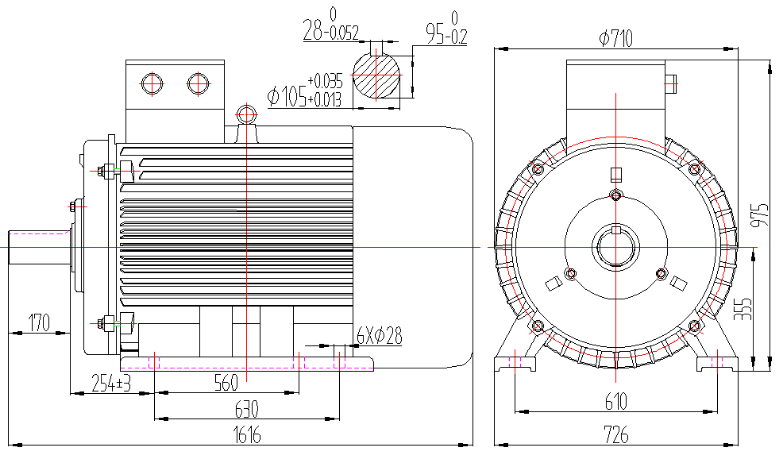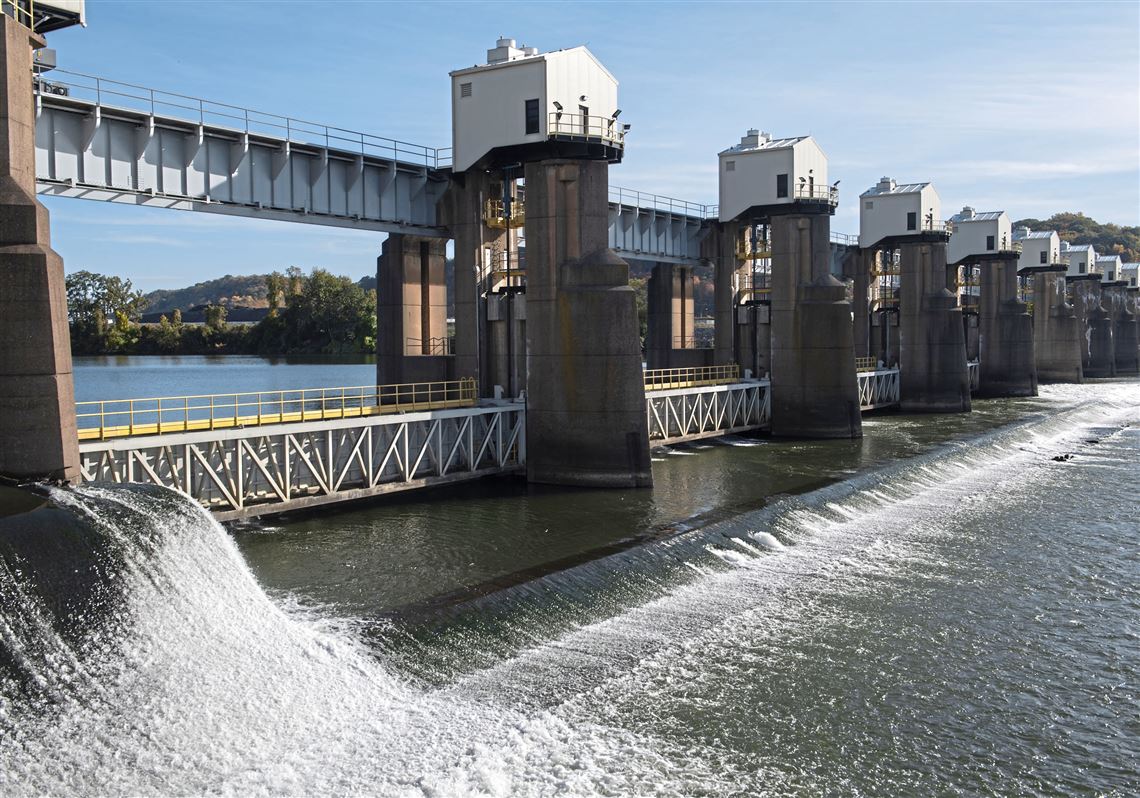QINGDAO ENNENG MOTOR CO.,LTD. |
|
Verified Suppliers
|
|
Green Energy Wind Turbine Permanent Magnet Generator Wholesale Price
Product Drawing

Technical Parameter
| 1 | Rare earth Nd-Fe-B permanent magnets |
| 2 | Low Speed |
| 3 | Direct Drive, no use gear-box |
| 4 | bearing |
| 5 | Power factor close to 1 |
| 6 | Maintenance-free can be used in all environments. |
| 7 | Long lifetime> 20 years, could run at high speed 24 hours 365 days. |
| 8 | Multi poles design improves the frequency and efficiency of rectifiers and inverters. |
| 9 | Customized: Voltage, Speed, Power, Frequency, etc. |
| 10 | H class insulation, vacuum pressure impregnation. |
| 11 | Excellent heat dissipation also can add fan cooling |
Detailed Pictures

The permanent magnet generator is a device that converts mechanical energy to electrical energy. In this device, the rotor windings have been replaced with permanent magnets. Permanent magnet generators are used mostly in industrial applications like turbines and engines to produce commercial electrical energy, the permanent magnet alternator is an alternate source of energy and has multiple benefits which make it a great device for a variety of residential, commercial, and industrial applications.
The structure
The permanent magnet generator is mainly composed of a rotor, end cover, and stator. The structure of the stator is very similar to that of an ordinary alternator. The biggest difference between the structure of the rotor and the alternator is that there are high-quality According to the position of the permanent magnet on the rotor, the permanent magnet generator is usually divided into a surface rotor structure and a built-in rotor structure.

Working Principle
The permanent magnet generator uses the principle of electromagnetic induction in that the wire cuts the magnetic field line to induce an electric potential and converts the mechanical energy of the prime mover into electrical energy output. It consists of two parts, the stator, and the rotor. The stator is the armature that generates the electricity and the rotor is the magnetic pole. The stator is composed of an armature iron core, uniformly discharged three-phase winding, machine base, and end cover.
The rotor is usually a hidden pole type, which is composed of excitation winding, iron core and shaft, guard ring, center ring, and so on.
The excitation winding of the rotor is fed with DC current to generate a magnetic field close to the sinusoidal distribution (called the rotor magnetic field), and its effective excitation flux intersects with the stationary armature winding. When the rotor rotates, the rotor's magnetic field rotates together with it. Every time a revolution is made, the magnetic lines of force cut each phase winding of the stator in sequence, and a three-phase AC potential is induced in the three-phase stator winding.
When the pm generator is running with a symmetrical load, the three-phase armature current synthesizes to generate a rotating magnetic field with synchronous speed. The stator and rotor fields interact to generate braking torque. The mechanical torque input from the turbine overcomes the braking torque and works.

The classification of permanent magnet generator:
Permanent magnet generators (PMGs) can be classified based on various factors, such as the type of magnet, the application, the number of phases, and the power rating. Here are some common classifications of permanent magnet generators:
Based on magnet type: a. Ferrite Magnet PMG: These generators use ferrite magnets, which are less expensive and have a lower magnetic strength than rare-earth magnets. b. Rare-Earth Magnet PMG: These generators use neodymium or samarium-cobalt magnets, which are more expensive but have a higher magnetic strength than ferrite magnets.
Based on application: a. Wind Turbine PMG: These generators are designed for use in wind turbines and are typically used in small-scale or off-grid applications. b. Hydroelectric PMG: These generators are designed for use in hydroelectric power plants and are typically used in large-scale applications.
Based on the number of phases: a. Single-phase PMG: These generators have a single output phase and are used in low-power applications. b. Three-phase PMG: These generators have three output phases and are used in high-power applications.
Based on power rating: a. Low-power PMG: These generators have a power rating of up to a few kilowatts and are used in small-scale applications. b. High-power PMG: These generators have a power rating of several megawatts and are used in large-scale applications, such as wind turbines and hydroelectric power plants.
These are some common classifications of permanent magnet generators, but there may be other ways to classify them based on specific parameters.
Features
① The generator has many poles, which improve the frequency and efficiency, saving the cost of rectifiers and inverters.
② Finite Element Analysis is used when designing the generator, compact structure. Low startup torque, solves the problem of small wind startup, improving wind energy utilization.
③ Leave out the gear increaser, improve the reliability and efficiency of the generator, and lower the amount of maintenance.
④ H class insulation, vacuum pressure impregnation.
⑤ Have many structures such as vertical axis, horizontal axis, internal rotor, external rotor, and plate type.
⑥ Strong rotors, the generator could achieve high speed.
⑦ Small size, lightweight, high energy density, suitable for special situations.
⑧ Run efficiency throughout the whole speed range, high efficiency.
⑨ Use imported high-speed oil-contained bearings, maintenance free, and high reliability.
By matching the power and speed of the generator to that of the wind turbine, the power system becomes more efficient. No gearboxes are needed, and the efficiency of the alternator exceeds 90%.

2. Variable speed generators provide a solution for Hydro Industry.
Increased efficiency from variable speed technology could make many more small hydro sites economically feasible to develop.

1. High efficiency: PMGs are highly efficient and can convert up to 90% of the mechanical energy into electrical energy. This means that they require less fuel or energy input to produce the same amount of electricity as other types of generators.
2. Low maintenance: PMGs have fewer moving parts than traditional generators, which means that they require less maintenance and are less likely to break down. This makes them a more reliable and cost-effective option in the long run.
3. Environmentally friendly: PMGs are a clean and renewable source of energy that produce no emissions or pollutants. They are an excellent option for off-grid applications or for powering remote locations where traditional power sources are not available.
4. Versatility: PMGs can be used for a wide range of applications, from small-scale residential use to large-scale industrial and commercial applications. They can be used to power homes, businesses, farms, and even entire communities.
5. Cost-effective: PMGs are generally more cost-effective than traditional generators, especially over the long term. Although they may have a higher upfront cost, their lower maintenance and fuel costs make them a more affordable option in the long run.
Overall, PMGs are an important technology for the future of renewable energy. As the world continues to shift towards cleaner, more sustainable sources of energy, PMGs will play an increasingly important role in meeting our energy needs.
The importance of the maintenance of wind power generation units:
Wind turbines must be placed in the field, and the operating conditions are very harsh. In order to improve the reliability of wind turbines and prolong the service life of the wind turbines, routine maintenance is very important. When exchanging experience in wind power generation, foreign experienced experts once said that the focus of wind turbines is maintenance, not repair. The life span of wind turbines depends on the quality of maintenance. The maintenance of wind turbines is not complicated.
Operation and maintenance personnel must have basic knowledge of wind power technology and be able to work at heights in cold and hot weather. At the same time, the equipment maintenance personnel must have the ability to analyze and judge significant failures in person and the ability to handle on-site, and be able to quickly carry out minor repairs on the spot. Therefore, equipment maintenance personnel should be familiar with the structure of wind turbines and participate in operation and maintenance training courses during the installation process. The following maintenance measures are available for reference:
(1) According to the drawings, materials and instructions provided by the manufacturer, prepare a detailed "Wind Power Operation and Maintenance Regulations" for relevant personnel to learn and implement them carefully.
(2) Seriously study the basic principles of wind power generation, understand the performance of wind turbines, and be proficient in starting and stopping methods.
(3) Regularly carry out ideological education to cultivate the sense of responsibility and professionalism of the staff.
(4) Accidents of generator sets should be carefully recorded, the reasons should be analyzed, and experience should be continuously accumulated.
The above points need your careful attention. If you still know more about wind turbines, please pay attention to the company website, we will update it regularly!